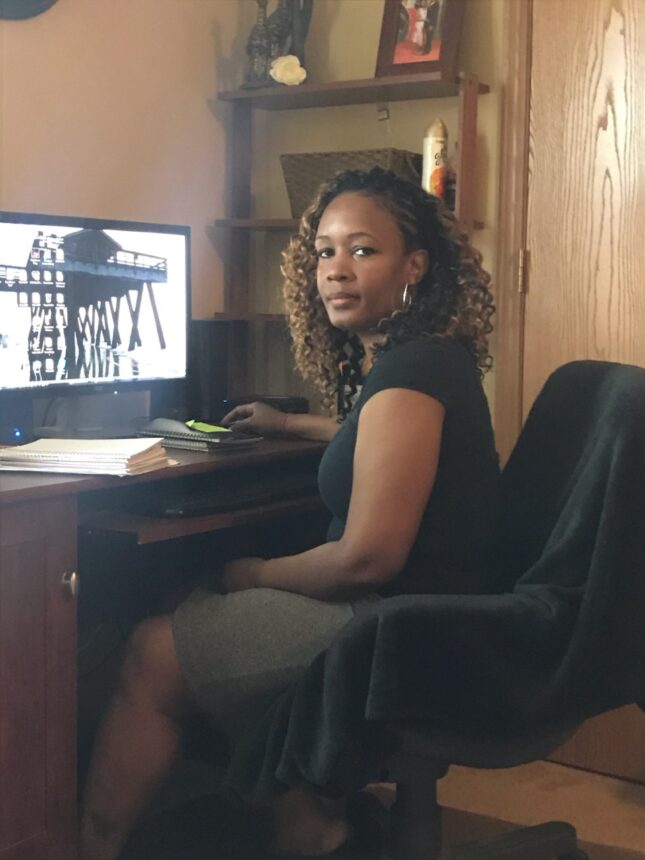
Fae Harper, Nurse coordinator of WashU Nephrology Renal Outpatient Office, working remotely from home.
Business as Usual
While healthcare workers on the front line have gotten much-deserved attention as they care forpatients during the COVID-19 crisis, there are also many WashU Nephrology members who are working hard behind the scenes to keep the division up and running.
Barbara Schmaltz, BSN, RN, nurse manager of the Renal Outpatient Office, and Jamie Hager, manager of Financial Operations, and their teams, are just examples of members of our division who have adjusted to new working conditions – including working from home – as they take care of business “as usual” to provide support to their patients during the lockdown.
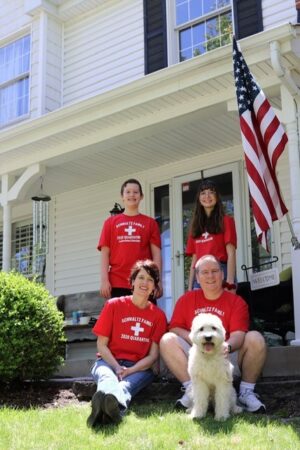
Barbara Schmaltz, nurse manager of Renal Outpatient Office, with her family at home.
Schmaltz manages the day to day operations for the ambulatory nephrology practice. “I work to remove barriers for my team for them to be able to provide exceptional care for our patients,” she says. Initially, this entailed a lot of effort getting the right equipment and software for the team to work remotely. Currently, they are using laptops or using remote access to their work desktop computers. They are planning to soon move their work desktop computers and monitors to their homes to improve access, help with workflow, and give the staff a sense of familiarity to their workday.
However, as Schmaltz puts it, “Technology when it works, is great. When it doesn’t, it is almost paralyzing!” Although she admits to some user error, she is quick to point out the WashU IT support team has been tremendous in helping get everything set up.
According to Schmaltz, another big challenge has been the change in workflow. “The nurses were used to being in the clinic, and now we do all the follow-up by phone. Our end stage renal disease classes that were previously held twice a month are now done one-on-one.” A nurse will either call and talk to the patient after sending them a copy of a slide presentation or send an invite and do the class over Zoom.
“We strive to make our patients feel – in spite of the situation – that they are supported and can access us for their needs at any given time.” Schmaltz wants to emphasize how helpful Dr. Dan Coyne, director of the medical multispecialty outpatient group and director of hemodialysis at Chromalloy, has been in directing schedule changes so that her team would know how to make changes to the scheduling templates.
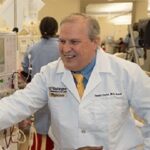
Dan Coyne, MD, helps outpatient clinic team work remotely.
According to Coyne, “The renal clinic medical assistants and nurses have kept our telehealth clinic schedules filled, and patients’ laboratory results flowing into our in-baskets. They have helped identify and communicate with our patients during this crisis. Without the hard work of our clinic staff, our clinics simply could not function.”
The outpatient team uses Zoom for staff meetings, as well as text messaging and email for most daily business. One difficulty, says Schmaltz, is not being able to walk away from the work. “The computer is always there. I will do one more thing, which leads to another and another. We are all working on a new work/life balance.”
The Alarm Still Goes Off at 4 AM
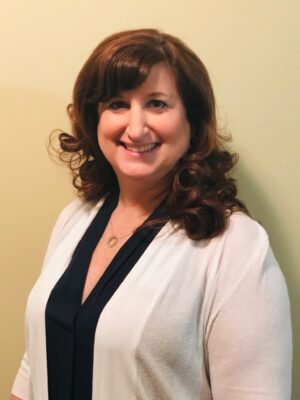
Jamie Hager, manager of Financial Operations. Hager’s team keeps in touch via phone, text, email and Zoom.
Jamie Hager manages the billing and collections for WashU Nephrology dialysis centers, the MD services in the community dialysis centers, and the accounting/purchasing activities. Initially, she was commuting to her office on campus only when necessary, such as to take care of the month-end closing or when the staff needed work sent to them from the office. That gradually changed to her going to the office about 2 days a week. “This helps me stay organized with paperwork that needs to be printed, filed, or mailed, and allows me to help the staff trouble-shoot any issues with their work-from-home processes.”
Although there were some issues early in the lockdown, her team has managed well. “I have to say the staff are doing quite well working from home,” says Hager. “Overall, the transition went fairly smoothly, and the staff acclimated quickly. In fact, they have gotten so used to their home offices, I think they will have a hard time if or when we transition back on campus!”
Hager’s team knows that they can reach her at any time via phone, text, and email. “We also hold weekly Zoom staff meetings and use Skype for Business for quick messages back and forth throughout the day.”
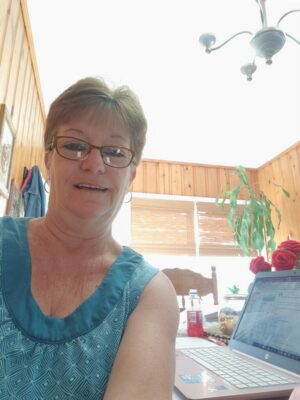
Billing department team member Brenda Leverett working at home. “My dining room is my desk!”
Billing associate and team member Brenda Leverett says, “This is the first time in my 46 years of employment that I have worked from home. I have kept my same routine, meaning my alarm clock still goes off at 4:00 in the morning, lunch is still at noon, and dinner is still at 5. The only challenging part was trying to figure out how to print my needed reports. I have that figured out now.” While she misses seeing her co-workers, Leverette says the billing team communicates as much as if they were still in the office. “I have to say that I enjoy working from home now and dread driving back and forth to work if/when that happens!”
Another billing team member, Liz Palmisano, IBC Asst III, says there were a lot of “unknowns” at first when she started working from home. How will my connection be? Will I be able to sign into the VPN? Will we be able to do our daily work effectively and efficiently? Will I be able to service our patient population without the face to face interaction we are used to? Will we be able to meet deadlines for our month end billing? It turns out her concerns were unfounded. “It has worked out wonderfully! The first month end billing was longer, just making sure you didn’t miss anything, but flowed great for everyone. Now after a couple of closings it is old news! We keep in close contact with each other through Skye business, email, and just call when needed. I feel this ‘success’ will only get better and more efficient with time. To say I have not missed the crazy HWY 40/64 commute is an understatement!”
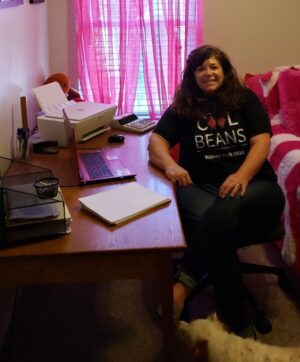
Liz Palmisano, IBC Asst III, sporting her Cool Beans t-shirt in her home office with her “assistant” Lucy.
Home Base
Working from home comes with challenges, but it also has its benefits.
“It’s definitely been a learning experience with some trial and error,” says Schmaltz. “Many of us have young children at home so this was a transition at first for our families to realize that we were really working!” It was a bit of a challenge with the schools being physically closed and the children also doing their work from home. “At our house, we did a hybrid with my children flipping their day. They do most of their schoolwork in the evening when I’m available to help, unless my husband can assist. I’m looking forward to the end of the school year wrapping up. However, with sports camps, etc. being cancelled or very limited, the ongoing challenge will continue!”
Schmaltz even came up with a ‘hack’ to make the day with her children go a little smoothly. “I prep lunches the night before so that they could do self-serve lunches and I would not be interrupted during my workday.” In addition, she confesses that there is one big benefit of working at home is: NO COMMUTE!
Says Hager, “I have to say, I do enjoy working from home. I haven’t really encountered any distractions, other than my husband, who is also working from home … we do often have dueling Zoom meetings! I also agree that the work/life balance is a challenge. I find that I work later into the evening, when under ‘normal’ circumstances I would have been packed up and out the door.”
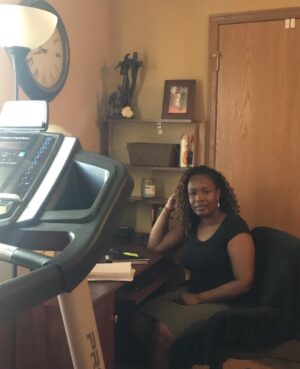
Fae Harper at her home desk, ready to jump on the treadmill at the end of the day.
Clinical nurse coordinator Fabrienne (Fae) Harper, BSN, RN, part of the Renal Outpatient Office team, agrees that working from home does have advantages and disadvantages. “I really enjoy working from home. Not having to commute every morning on the Metro Link is a benefit in itself!” But Harper stresses that it is challenging to balance one’s work and home life. “I find myself working at as early as 5 am and as late as 11 pm because the work is at home with me now. If I find myself with some open time, I will log on to see if there is anything that is needed – until I hear my family ask, ‘Are you still working?!’ Because our patients’ care never stops, there is always something to do.”
However, certain things are missed by working remotely. “I do miss clinic time with the patients and my team of doctors,” says Harper. “I enjoy being able to sit and talk with the patients and doctors. There is always something new to learn during our team clinics, whether it is about patient care or how each of our day has been going so far. The fact that I work with some of the best doctors is also a huge help when it comes to working at home.”
Harper does like the fact that her “home” work offers a workout facility on the property. “My treadmill is right next to my desk/workstation. So, on my lunch break or right after I log out, I can hop right on the treadmill and work off all of the snacks I ate for the day.”
Feeling Connected
Schmaltz and Hager both say that the leadership team (sr. director of business operations and management Jodean Baldauf, division chief Dr. Ben Humphreys, and chair of the Department of Medicine Dr. Victoria Fraser) has been essential for their teams’ success, providing daily communications to what is happening with COVID-19, processes, and updates.
“Every person in our team has been valuable in making the new normal possible for our patients,” says Schmaltz, who points out that in recognition, #NephSTRONG t-shirts were handed out to the team. “This was a simple gesture, but it meant a lot.” In addition, the team’s director (Baldauf), even ordered cupcakes for everyone. “Again, it was a nice gesture that made everyone feel connected while apart.”
Working with a team of co-workers who have a common goal of great patient care also keeps everyone connected. “We all work together to make sure the patient has what the patient needs,” says Harper. “I miss seeing my co-workers – talking with Julie around the coffee pot, making smoothies on break with Teana and Coco, or spinning around in my seat to laugh about something funny with Jeni. But because we have worked so closely and make such an awesome team, we still communicate and help each other out with our work to make sure that the patient’s needs have been met.